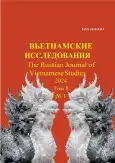Обряды власти: исследование гармонии трёх учений во Вьетнаме в период правления династии Начальных Поздних Ле (ЛеШо) (1428—1527)
- Авторы: Ле Д.1, Чан Ч.2,1
-
Учреждения:
- Ханойский государственный университет
- ВАОН
- Выпуск: Том 8, № 1 (2024)
- Страницы: 81-93
- Раздел: Научные исследования
- URL: https://journal-vniispk.ru/2618-9453/article/view/255279
- DOI: https://doi.org/10.54631/VS.2024.81-607329
- ID: 255279
Цитировать
Полный текст
Аннотация
В данной статье исследуется гармония трёх учений в Дайвьете в период династии Начальных Поздних Ле (Ле Шо) (1428–1527). Большинство предыдущих исследований показывали, что в период Ле Шо утверждалась монополия конфуцианства и отвергались буддизм и даосизм. В данной статье доказывается, что династия Начальных Поздних Ле активно использовала конфуцианскую классику династии Сун, применяла модель конфуцианского государства великой Минской династии, продолжая при этом разрабатывать политику управления на основе даосизма и буддизма. Гармония трёх учений представляла собой династическую политику, в которой конфуцианство играло главную роль в идеологической, политической и культурной сферах, а буддизм и даосизм – вспомогательную роль в ритуальной и религиозной жизни двора и в фольклоре. Результаты исследования показывают, что гармония трёх учений является константой вьетнамской истории, начиная с династий Ли – Чан. Королевский двор Начальных Поздних Ле развивал конфуцианские культурные учреждения и управлял буддийскими и даосскими монастырями, храмами и ритуалами. Это также можно считать основой для объединения трёх учений на более поздних стадиях.
Ключевые слова
Полный текст
Открыть статью на сайте журналаОб авторах
Динь Шон Ле
Ханойский государственный университет
Автор, ответственный за переписку.
Email: ledinhson@gmail.com
н. с. Институт Чан Нян Тонга
ВьетнамЧонг Зыонг Чан
ВАОН; Ханойский государственный университет
Email: trantrongduonghn@gmail.com
к. и. н., с. н. с. Институт хан-нома; доцент, школа междисциплинарных исследований
ВьетнамСписок литературы
- An Nam vũ cống [Book of Geography of the Great Viet], composed by Nguyễn Trãi, woodcut A.2251. Hà Nội: Institute of Sino-Nom Studies.
- Đại Việt sử ký toàn thư [Complete Annals of Đại Việt], Woodcut SA.PD 2310 (deposited in the library of the Asiatic Society in Paris).
- Gents, J. (2013). Religious diversity in Three Teachings Discourses, in: Religious Diversity in Chinese Thought, ed. Perry Schmidt-Leukel and Joachim Gents. New York: Palgrave – Macmillan.
- Kelley, L.C (2003) Vietnam as a ‘Domani of Manifest Civility’ (Văn Hiến Chi Bang). Journal of Southeast Asian Studies, 34: 63–76.
- Nguyễn Kim Sơn (2007). Xu hướng hội nhập tam giáo trong tư tưởng Việt Nam thế kỉ XVIII [Nguyen Kim Son. The Convergence of Three Teachings in Vietnamese thought in the 18th century]. Nghiên cứu Tôn giáo [Religion Research Review], 8: 14–20.
- Nguyễn Lang (2014). Việt Nam Phật giáo sử luận [Nguyen Lang. History of Vietnamese Buddhism]. Hà Nội: Văn học.
- Nguyễn Minh Tường (2015). Tổ chức bộ máy nhà nước quân chủ Việt Nam (từ năm 939 đến năm 1884) [Nguyen Minh Tuong. Organization of Vietnamese Monarchy State Apparatus (from 939 to 1884)]. Hà Nội: Khoa học Xã hội.
- Nguyễn Xung Xác (1498). Khôn nguyên chí đức chi bi [Nguyen Xung Xac. Tomb Stele of Queen Ngô Thị Ngọc Dao]. Hà Nội: Institute of Sino-Nom Studies. No.1919.
- Phan Huy Lê (2016). Lịch sử Việt Nam [Phan Huy Le. History of Vietnam]. Hà Nội: Nhà xuất bản Đại học Quốc gia Hà Nội.
- Phung Minh Hieu (2017). Land and water: A History of Fifteenth Century Vietnam from an Environmental Perspective. Ph.D. Thesis. University of Hawaiʻi at Mānoa.
- Onishi Kazuhiko (2009). Đạo giáo và tư tưởng thiên mệnh của vua Lê Thánh Tông [Taoism and the idea of destiny of King Le Thanh Tong], in: Nghiên cứu tư tưởng Nho gia Việt Nan từ hướng tiếp cận liên ngành [Research on Vietnamese Confucian Thought from an Interdisciplinary Approach]. Institute of Sino-Nom Studies, Vietnam – The Harvard Yenching Institute. Hà Nội: Thế Giới. P. 433–452.
- Shimizu Masaaki (2010). A Phonological Reconstruction of the 15th Century Vietnamese – Using Chữ Nôm Materials. International Conference on Vietnamese and Taiwanese Studies. Taiwan: National Cheng Kung University. P. 2–3.
- Tạ Ngọc Liễn (2009). Diện mạo Nho giáo ở Việt Nam thế kỷ XV–XVIII [Ta Ngoc Lien. Manifestation of Confucianism in Vietnam in 15th–18th Centuries], in: Research on Vietnamese Confucian Thought from an Interdisciplinary Approach. Hà Nội: Thế Giới, 130–149.
- Trần Đình Hượu (2020). Về xu hướng Tam giáo đồng nguyên trong Trúc Lâm Tông Chỉ Nguyên Thanh [Tran Dinh Huou. Regarding the trend of the The Convergence of Three Teachings in Trúc Lâm Tông Chỉ Nguyên Thanh], in: Lịch sử tư tưởng Việt Nam và Phật giáo trong lịch sử tư tưởng Việt Nam [History of Vietnamese Thought and Buddhism in History of Vietnamese Thought]. Hà Nội: Đại học Sư phạm. P. 494–514.
- Trần Quốc Vượng (2020). Mấy ý kiến về Phật giáo và văn hóa dân tộc [Tan Quoc Vuong. Some Opinions about Buddhism and National Culture], in: Lịch sử tư tưởng Việt Nam và Phật giáo trong lịch sử tư tưởng Việt Nam [History of Vietnamese Thought and Buddhism in History of Vietnamese Thought]. Hà Nội: Đại học Sư phạm. P. 419–430.
- Trần Trọng Dương (2011), Văn hiến Đại Việt thế kỷ XV qua trường hợp hoàng đế Lê Thánh Tông [Tran Trong Dương. Culture of Dai Viet in 15th century through the Case of Emperor Lê Thánh Tông]. Nghiên cứu và phát triển [Research and Development Review], 6: 3–28.
- Trần Trọng Dương (2023). Doctrine beyond Borders: The Sinographic Cosmopolis and Religious Classics in Vietnam from the Tenth to Fourteenth Centuries. Sungkyun Journal of East Asian Studies, Duke University Press, 1 (23): 1–25.
- Yu Insun (1978). Law and Family in Seventeenth and Eighteenth Century Vietnam. University of Michigan.
- Nguyễn Tài Cẩn (2004). Nguồn gốc và quá trình hình thành cách đọc Hán Việt [Nguyen Tai Can. Origin and Formation of Sino-Vietnamese Pronunciation]. Hà Nội: Khoa học Xã hội.
Дополнительные файлы









